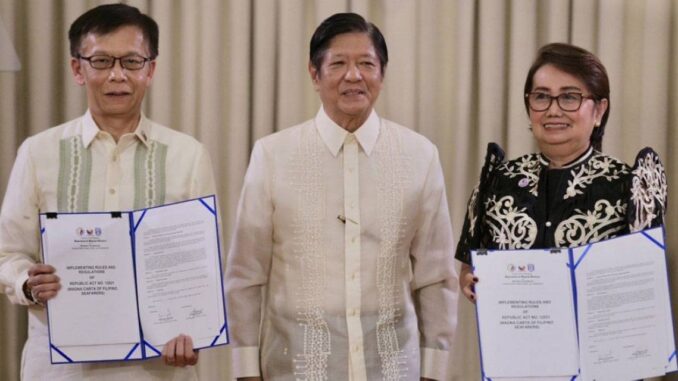
PRESIDENT Ferdinand Marcos Jr. on Wednesday witnessed the signing of the implementing rules and regulations (IRR) of the Magna Carta of Filipino Seafarers, which aims to protect the rights and welfare of both domestic and overseas mariners and promote their full employment.
The IRR was finally signed three months after the president enacted Republic Act 12021 on Sept. 23, 2024.
“I am as happy as anyone that we [now] have the IRR. We can now implement all of the provisions in the Magna Carta for our seafarers. It is a very important day for Filipino seafarers for whom we have done all of these,” Marcos said following the ceremonial signing of the document by Department of Migrant Workers (DMW) Secretary Hans Leo Cacdac and Maritime Industry Authority (Marina) Administrator Sonia Malaluan held in Malacañang.
“The sea has always been a powerful metaphor for life. It is vast, challenging, [and] unpredictable, yet full of opportunities. And as we welcome a brand-new year, we set anchor on a long-awaited shore. Only three months after I signed the Magna Carta of Filipino Seafarers, we now witness the signing of its implementing rules and regulations. This reinforces our commitment to ensuring the welfare of our seafarers,” he added.
At last President Ferdinand Marcos Jr. witnesses the signing ceremony of the Implementing Rules and Regulations (IRR) of the Magna Carta of Filipino Seafarers, with Secretary Hans Leo Cacdac of the Department of Migrant Workers and Administrator Sonia Malaluan of the Maritime Industry Authority as the signatories. The event was held at the Presidential Broadcast Studio in Malacañang on Jan. 8, 2025. Photo by Mark Balmores/PPA Pool
The law outlines steps the government has put in place to improve the working conditions, benefits, and social protection of Filipino seafarers, who are key contributors to the global shipping industry and vital to the Philippine economy.
The Magna Carta also enshrines comprehensive legal protection for Filipino seafarers, ensuring they are treated with dignity and respect throughout their careers as well as making sure that their training and certification are at par with international standards.
“This step not only opens more opportunities in the maritime industry; this also mirrors our dedication to having a more progressive and equal policy in the maritime industry. It also envisions a well-prepared and competitive maritime workforce. By enhancing access to advanced training and requiring maritime education institutions to adopt cutting-edge facilities, we are equipping our seafarers and cadets to compete in the global arena,” Marcos said.
Key features of the IRR include:
- Seafarers’ rights: The IRR codifies essential rights for Filipino seafarers, including the right to safe passage, protection against harassment and discrimination, fair medical assessments, and the right to free legal representation. The IRR ensures seafarers are informed, protected, and treated fairly throughout their contract.
- Support for women in the maritime industry: The new regulations emphasize gender equality in the maritime sector, requiring companies to implement policies that promote women’s participation, access to education, and career opportunities. It guarantees women seafarers protection from gender-based discrimination, setting a new standard for inclusive practices in the industry.
- Fair employment standards: The IRR sets clear, transparent employment standards, including guidelines for working hours, rest periods, job descriptions, and compensation. Seafarers’ contracts will undergo periodic reviews to ensure they align with global maritime standards.
- Wages and benefits: RA 12021 guarantees fair wages for seafarers, ensuring timely payment of salaries, sick leave, vacation leave, and death benefits. Additionally, seafarers may now designate more than one beneficiary for their allotments, enhancing financial security for their families.
- Social protection and welfare: Under the IRR, all Filipino seafarers are entitled to membership in social protection programs such as the Overseas Workers Welfare Administration (OWWA) and the Social Security System (SSS), ensuring that seafarers and their families are supported by crucial safety nets.
Also present to witness the IRR signing were Labor Secretary Bienvenido Laguesma, Transportation Secretary Jaime Bautista, DMW Undersecretary Bernard Olalia, chairman of the Technical Working Group, and other government officials.
Sen. Raffy Tulfo, chairman of the Senate Committee on Migrant Workers, praised the signing of the IRR.
Tulfo, principal sponsor and one of the main authors of the Magna Carta of Filipino Seafarers at the Senate, said the IRR is a product of thorough consultation, review and collaboration among all stakeholders to ensure that every provision of the law serves the best interest of domestic and overseas Filipino seafarers.
“This IRR will ensure that important provisions of the law are followed and will ensure that the rights and privileges of Filipino seafarers are adequately protected if they encounter problems while performing their duties,” he said in Filipino.
Tulfo added that the IRR also promotes full employment for Filipino seafarers while ensuring equal opportunities in the maritime industry for equitable access to education, training and development, regardless of gender.
Likewise, he stressed that the IRR recognizes shipowners, maritime higher education institutions (MHEIs), and manning and recruitment entities as vital partners in protecting and empowering Filipino seafarers.
The senator also thanked President Marcos for prioritizing the welfare of Filipino seafarers.





Be the first to comment